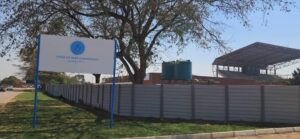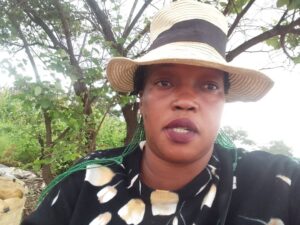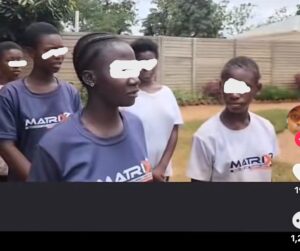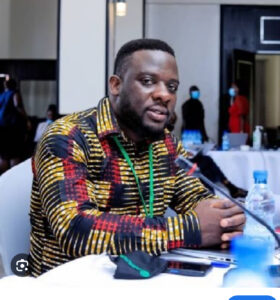Brenna Matendere
Two of Zimbabwe’s leading drug rehabilitation hubs, Matrix Rehabilitation Centre and Angel of Hope Foundation, are among a plethora of sprouting correctional centres that are increasingly taking the limelight for human rights abuses and corruption. .
This emerged during an investigation supported by Information for Development Trust, a non-profit outfit promoting accountability journalism in Zimbabwe and Southern Africa.
The investigation established that some of the victims at such detention centres who are being arbitrarily rounded up are as young as nine.

Inside the detention centres
Auxillia Mnangagwa, Zimbabwe’s first lady, founded Angel of Hope in February 2018, a few months after her husband emerged as the new president following a military-assisted power takeover from the late Robert Mugabe, and is its patron.
The hub—a recipient of international recognition and support from such institutions like Medishare Rotary Australia, EverX and Krishna Institute of Medical Sciences— has been working with vulnerable populations, particularly women, girls and youths to provide basic healthcare, education and social support.
Drug rehabilitation was not part of its founding core objectives, but the institution seems to have taken a cue from President Mnangagwa’s six-year Multi-Sectoral Drug and Substance Abuse policy launched in June 2024.
Angel of Hope set up its first 200-capacity rehabilitation centre in the populous southwestern suburb of Mbare in Harare, the capital, in July 2025, offering free one-month programmes for individuals battling substance abuse through group therapy, counselling and psychological assessments.

Matrix, which has fast turned into talking stock due to its robust and dramatic posts that capture its activities on social media, already has a damp profile.
Its founder and ex-policeman, Tafadzwa Chidawa (36) popularly known as Detective Kedha, and his partner, Clara Manyepera (38), were in March this year arrested and brought before the Harare magistrates court for allegedly operating an illegal quasi-military disciplinary and training camp in New Marlborough, Harare.

This facility is different from the drug rehabilitation centre, which is located in Ruwa, some 20km southeast of the capital.
The duo was accused of operating a non-profit organisation without requisite registration and impersonating child protection officers for offering services reserved for qualified personnel, among them counselling, child supervision and behaviour correction, in contravention of child protection laws.
The two are on US$300 bail each.
The investigation uncovered similar concern around correctional hubs that include Care Addictions Rehab and Active Youth Zimbabwe in the second capital, Bulawayo, Healthy Lifestyle Institute in Kwekwe and Youth with A Mission in Rusape,
Matrix takes in an average of 90 inmates each week, adding up to 3,780 a year, while Angel of Hope admits roughly 100 detainees a month, with many families preferring it because services are free.
The hubs detain them on the excuse to isolate drug users from their perceived drug suppliers known in street language as “jazzmen” so that, after lengthy periods of not using the drugs, they would stop craving for the illegal substances.
In some cases, staff and bouncers from the rehab centres are dispatched to go out, lure the drug users to come to the centres on the pretext of going for medical checkups but, once inside, they are ensnared.
But in almost all the cases, the targets who they would have already labelled social misfits are dragged in under false pretenses—told they are going for a job interview or to collect goods—only to find themselves locked up.
The Matrix detention centre in Ruwa presents the perfect camouflage for this; painted in blue, has no signage showing it is a rehabilitation centre and passes as an ordinary residential place.
Back in Harare’s central business district, investigations established, Matrix runs an office on the tenth floor of Karigamombe Centre from where bouncers are deployed to pounce on drug targets and round up them up for transfer to the rehab centre.Once inside, the drug users are immediately detained without their consent and restricted from leaving the centre.
Their daily routines resemble that of prisoners. They are woken up early in the morning, forcibly taken to parade, roll-called, go through military drills and physical exercises and are forced to make testimonies on their previous lives.
The drills typically involve military style torture that includes rigorous press-ups, ground spinning, frog marching and “air seating”.


Typical of military training camps and detention barracks, several videos obtained during the investigation show, the detainees are drenched in cold water in the middle of the night or during parade time while dressed, with fellow detainees jeering at them.
In another short video, a detainee is seen lying face down with an instructor holding a sjambok, suggesting that Matrix is using corporal punishment to manage the detainees.
More video footage on the Matrix social platforms, mostly TikTok, shows that they are subjected to compulsory “medical” tests for drug traces when they are brought in, but the enforcers use rudimentary methods and do not have the services of experts available.
Investigations revealed other widespread uses of dangerous or unapproved therapies like forced fasting and solitary confinement of inmates.
There are fears that some of these centres are administering unlicensed medications or using harmful, unscientific methods, in violation of the Public Health Act and Medicine Control Act, which regulate the usage of medication and medical treatments in Zimbabwe.
The inmates bath, eat and sleep in accordance with rigid timetables and are forced to abruptly cease drug consumption.
Medical experts warn that this sudden stoppage can cause physical health risks like dehydration, electrolyte imbalance and potential organ damage, in addition to increased anxiety, depression and suicidal tendencies.
It also increases the risk of relapse and, the investigation established, a substantial number of the inmates go back to drugs as the rehabilitation centres do not bother to follow-up on their “patients”.
At Matrix, guardians are made to sign a consent form on behalf of the detainees, who are also made to append their signatures on the document under duress.
In a separate online video, a detainee at the Matrix camp says he was brought to the centre on the pretext that he was going to collect goods sent to him by a sister living in the UK.
“When we arrived, I was then told, here we do not receive and distribute goods sent from abroad to their relatives. They said this place is called Matrix and you are under detention. That is when I realised I had been sold a dummy,” he said.
Although Angel of Hope is free, corruption has crept in. Some staff reportedly take bribes to admit wealthier families’ cases first.
When contacted, the foundation declined to comment, with a lady saying: “Please refer to me only as a girl from Angel of Hope Foundation…We are unable to give out any response.”
Angel of Hope Foundation does not have bouncers but asks guardians to persuade suspected drug users to go to its institution on the pretext that they will be offered jobs.
At the hub’s gate at Stodart Hall in Mbare, a woman sits on a chair with note book where she writes down names and physical addresses of alleged drug addicts provided by guardians or neighbours.
She then places the alleged drug users on a waiting list and records the contact details of those that would .have brought them in.
When this publication arrived at the centre, a man who wanted to have his brother in law detained, was making a report.
He said he had chosen the centre because it provided free services, loudly remarking that the brother-in-law he had brought in was not mentally challenged but just acted strangely.
Mary Takaendesa from the nearby Matapi Flats in Mbare accused Angel of Hope Foundation officers of taking bribes to “jump” applicants on the ever-growing list.

“The rehab centre is supposed to be free but people working there now take bribes to sideline those drug users registered by poor guardians. I tied my child and took him there but I was shocked that, after leaving him there, he was released the same day and another one taken to replace him,” she said.
The foundation requested our media queries in writing but a lady who refused to identify herself in a telephone follow-up query declined to comment.
“Please refer to me only as a girl from Angel of Hope Foundation. Upon review of your enquiry, please note that we are unable to give out any response regarding your enquiries or any other information that is related to the Mbare rehabilitation centre,” she said.
Profiteering from addiction
For Matrix and numerous more hubs in Harare and other parts of the country, drug addiction is a good curse, because it is allowing them to make profits.

Detention periods span from a month to three, depending on the financial muscle of the guardians or neighbours to pay the fees.
Matrix “rehabilitates” children and adults whose ages range from nine to 42 years.

Teenage girl inmates at Matrix
They charge US$ 800 per month for a detainee enrolled in Camp 3 while Camp 1 and Camp 2 charge US$400 and US$600 per month, respectively, based on the purported services offered.
Assuming that each inmate spends a month at the centre, it means that Matrix is raking in at least US$2.8 million per year, on the basis that it is enrolling 90 “offenders” a week.
On top of that, families must provide long lists of clothing, toiletries, and household items. The financial model exposes these centres as profit-making businesses disguised as rehabs.
The fees are not stipulated or authorised by any relevant public office.
Officials are aware
Evidently, authorities know about the goings-on at the offending rehab centres.
Police spokesperson, Paul Nyathi, said the law enforcement agency was aware of these unprocedural detentions, adding that they were investigating but did not identify the offenders under its radar.
“The Zimbabwe Republic Police has indeed handled few case involving pseudo drug rehabilitation centres operating unlawfully. The police is also conducting awareness campaigns engaging with the community and conducting outreaches to educate the public about risks associated with pseudo rehabilitation,” he said.
Health ministry permanent secretary, Aspect Maunganidze, expressed concern over the illegal rehabilitation hubs.
He said inspections were ongoing and claimed some facilities had already been shut down, without naming them.
“The Ministry wishes to emphasise that rehabilitation services must meet established standards of care to ensure the safety and dignity of patients. We encourage families and individuals seeking help to use registered facilities only, as these are monitored to provide quality and ethical treatment,” he said.
Maunganidze asked for time to find out if Angel of Hope and Matrix were being investigated but failed to do so on follow up media queries.
The Gweru Provincial Hospital medical superintendent, Dr Fabian Mashingaidze, insisted that only mental health patients at extreme stages can be detained compulsorily in line with the Mental Health Act.
Founder Tafadzwa Chidawa denied wrongdoing, claiming that all admissions were voluntary.
He also claimed that the bouncers were “private investigators” used only when candidates turned violent or went missing, insisting that physical drills were needed to detoxify the detainees and adding that the high fees were needed to run the private hub.
“Candidates are admitted either through their parents/guardians or by self-enrollment. No admission is processed without the candidate’s consent. As part of our standard procedure, consent forms must be completed and signed prior to enrollment,” he said.
“It’s not a secret that we use intense physical activities as a process for detoxification,” he added.
“Our institution operates as a disciplinary camp, catering not only for individuals struggling with drug and substance abuse but also to those facing challenges with behavioural and moral discipline. We utilize non-pharmacological methods in addressing drug addiction and related issues,” said the hub’s director.
Civil society outcry
Lawyers and civil rights experts were clear: these detentions are illegal.
Paida Saurombe a member of Zimbabwe Lawyers for Human Rights (ZLHR), told this publication that rehabilitation centres did not have powers to enforce compulsory detention of suspected drug users.

“It’s illegal. It amounts to abducting a person. The constitution guarantees the right not to be deprived of your liberty arbitrarily or without just cause. Forced admissions amount to depriving a person there personal liberty. It also amounts to deprivation of freedom of association. The centres need consent or there must be a court order to admit a person,” he said.
Even the national anti-drug policy launched last year does not list compulsory detention of suspected drug users.
Wilson Box, the Zimbabwe Civil Liberties and Drugs Network (ZCLDN) director, says drug abuse must be considered as a public health issue and users must not ne criminalised for their condition but only the peddling and possession of prohibited substances.
“It’s unfortunate that the drug and substance use advocacy has now been hijacked by people bent on making profits and seeking relevance in a national crisis we have today.
“Drug use is driven by a lot of factors including socio-economic conditions and personal circumstances. So, forcing someone to be detained without evidence and knowledge of the circumstances surrounding that drug use is unacceptable.
“There is need for the country to take the challenge of drug use as a public health concern and not a criminal issue for people who use and inject drugs. Let’s provide proper treatment services in approved drop in centres or rehabilitation centres which are well manned by well-trained medical personnel,” he said.
Box indicated his organisation was preparing a legal challenge against the rehab centres.
Hwange member of parliament and acting chairperson of the portfolio committee on health, Daniel Molokele, said enforced detentions of drug users must be stopped.
“It is definitely incorrect and illegal. Largely, rehabilitation must be a voluntary process. The police must take strong action against any form of forced rehabilitation,” he said.
Kudakwashe Madzima, a community health worker in Mbare, said arbitrary detentions were spawning mistrust against bona fide social workers.
“When I talk to the youths, you can see they now believe that perhaps I will end up going to register them at the Mbare rehabilitation centre, so they now shun me,” he said.
Zimbabwe is a signatory to multiple international conventions—including the African Charter on Human and Peoples’ Rights, the International Covenant on Civil and Political Rights and the Convention on the Rights of the Child—that prohibit arbitrary detentions. On the other hand, Zimbabwe has several laws and regulations governing drug and substance abuse but none provides for compulsory detention of suspected drug users at rehabilitation centres.

